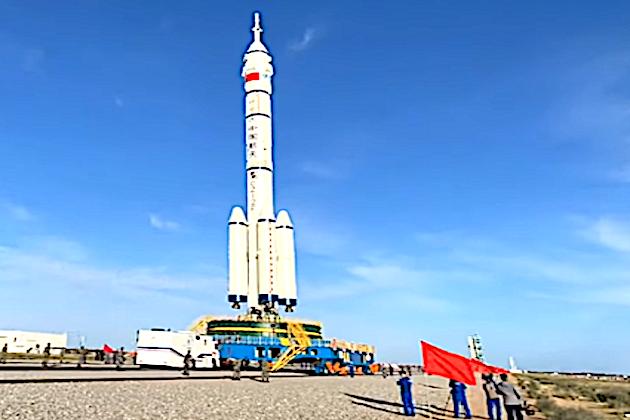

BEIJING, China: Three astronauts from China have arrived at the country’s new space station, a major achievement for a national space program that is becoming one of the world’s most advanced.
The three-person crew, Zhai Zhigang, Wang Yaping and Ye Guanfu, lifted off on a Shenzhou-13 spacecraft launched by a Long March 2F rocket from the Jiuquan Satellite Launch Center in the Gobi Desert, Inner Mongolia.
According to the China Manned Space Agency, the spacecraft docked at Tiangong Space Station about six and a half hours after launch.
The team will live and work at the station for 183 days, or just about six months, testing the station’s technology and conducting spacewalks.
The mission will be a key opportunity for Chinese astronauts to become familiar with long-term space missions and enable them to help prepare future astronauts.
“In the first place, any crewed mission is significant, if only because space travel by humans remains a risky endeavor,” said Dean Cheng, senior research fellow at the Davis Institute for National Security and Foreign Policy, as reported by CNN.
“For the Chinese, this is still early in their human spaceflight effort, as they have been doing this for less than 20 years and for fewer than 10 missions. If the Chinese maintain this pace, it reflects a major shift in the mission tempo for their human spaceflight efforts,” he added.
U.S. political objections and legislative restrictions have prohibited Chinese astronauts from going to the International Space Station, leading China to establish a long-term goal of building its own station.
Some countries, such as Russia, have reached out to collaborate with China, but it is not clear whether the European Union will cooperate.
A reason space research cannot be separated from politics and why the issue is so complicated is because “The Chinese space program is heavily influenced, and its human and lunar programs are overseen, by the Chinese military,” Cheng stressed.
However, David Burbach, associate professor of national security affairs at the U.S. Naval War College, said “Many American allies are willing to engage with China on space exploration, and the U.S. probably does not gain much from taking such a hard line,” as quoted by CNN.
American assistance might no longer be needed by China, which is significantly ahead of Europe and catching up fast with the U.S., he added.
“The development of China’s manned spaceflight is based on our own plan. We have our strategy and our plan,” said Lin Xiqiang, deputy director-general of the China Manned Space Agency, according to CNN.
24World Media does not take any responsibility of the information you see on this page. The content this page contains is from independent third-party content provider. If you have any concerns regarding the content, please free to write us here: contact@24worldmedia.com

Common Mistakes When Using Athletic Field Tarps

High-Performance Diesel Truck Upgrades You Should Consider

Warehouse Optimization Tips To Improve Performance

Fire Hazards in Daily Life: The Most Common Ignition Sources

Yellowstone’s Wolves: A Debate Over Their Role in the Park’s Ecosystem

Earth Day 2024: A Look at 3 Places Adapting Quickly to Fight Climate Change

Millions of Girls in Africa Will Miss HPV Shots After Merck Production Problem

This Lava Tube in Saudi Arabia Has Been a Human Refuge for 7,000 Years

Four Wild Ways to Save the Koala (That Just Might Work)

National Academy Asks Court to Strip Sackler Name From Endowment

Ways Industrial Copper Helps Energy Production

The Ins and Out of Industrial Conveyor Belts